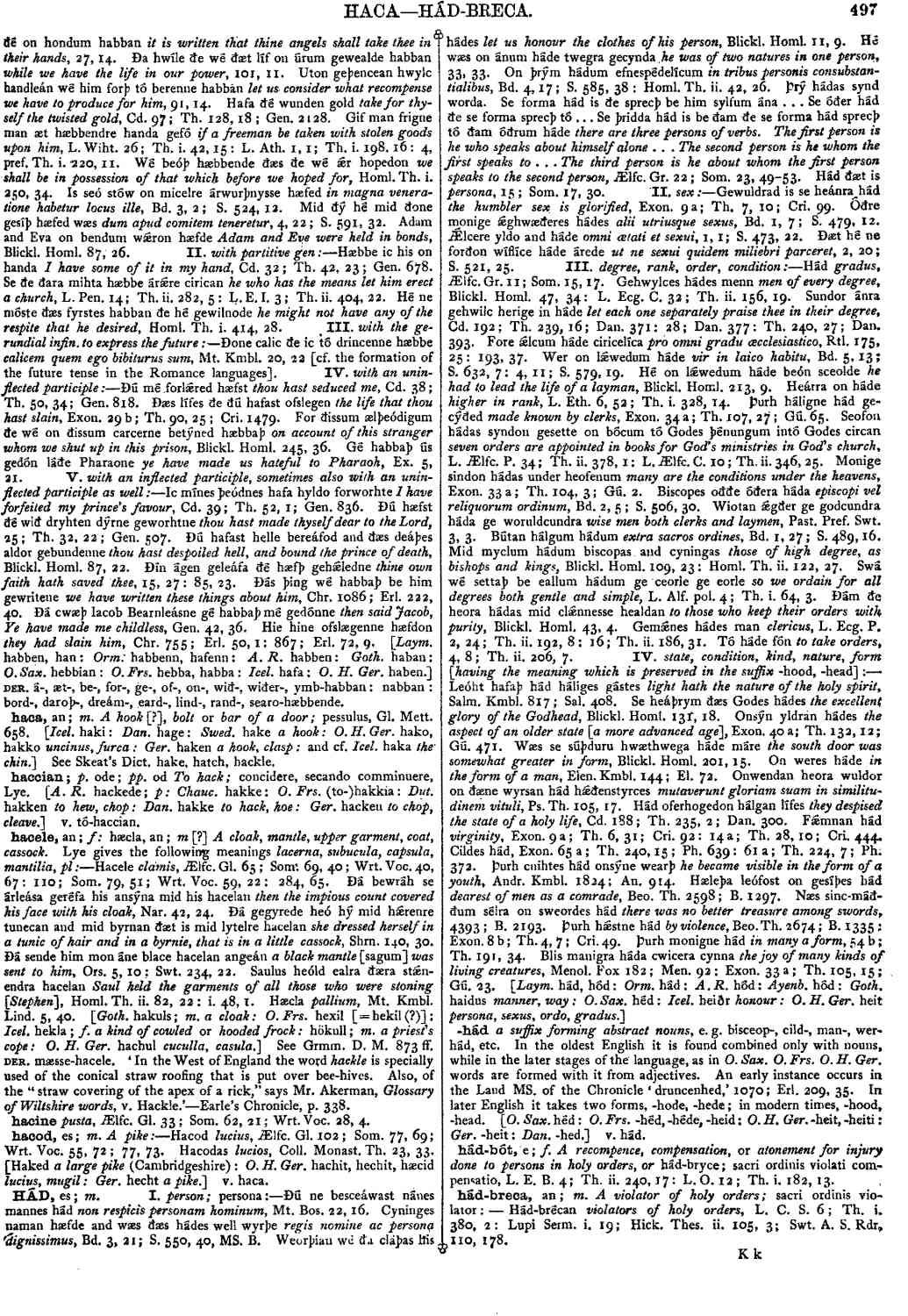HÁD
- noun [ masculine ]
-
Ðú ne besceáwast nánes mannes hád
non respicis personam hominum,
- Mt. Bos. 22, 16.
-
Cyninges naman hæfde and wæs ðæs hádes well wyrþe regis nomine ac persona dignissimus, Bd. 3, 21; S. 550, 40, MS. B. Weorþian wé ða cláþas his hádes
let us honour the clothes of his person,
- Blickl. Homl. 11, 9.
-
Hé wæs on ánum háde twegra gecynda
he was of two natures in one person,
- 33, 33.
-
On þrým hádum efnespédelícum
in tribus personis consubstantialibus,
- Bd. 4, 17; S. 585, 38 : Homl. Th. ii. 42, 26.
-
Þrý hádas synd worda. Se forma hád is ðe sprecþ be him sylfum ána . . . Se óðer hád ðe se forma sprecþ tó ... Se þridda hád is be ðam ðe se forma hád sprecþ tó ðam óðrum háde
there are three persons of verbs. The first person is he who speaks about himself alone . . . The second person is he whom the first speaks to . . . The third person is he about whom the first person speaks to the second person,
- Ælfc. Gr. 22; Som. 23, 49-53.
-
Hád ðæt is
persona,
- 15; Som. 17, 30.
-
Gewuldrad is se heánra hád
the humbler sex is glorifed,
- Exon. 9 a; Th. 7, 10; Cri. 99.
-
Óðre monige ǽghwæðeres hádes
alii utriusque sexus,
- Bd. 1, 7; S. 479, 12.
-
Ǽlcere yldo and háde
omni ætati et sexui,
- 1, 1; S. 473, 22.
-
Ðæt hé ne forðon wíflíce háde árede
ut ne sexui quidem miliebri parceret,
- 2, 20; S. 521, 25.
-
Hád
gradus,
- Ælfc. Gr. 11; Som. 15, 17.
-
Gehwylces hádes menn
men of every degree,
- Blickl. Homl. 47, 34 : L. Ecg. C. 32; Th. ii. 156,
19.
-
Sundor ánra gehwilc herige in háde
let each one separately praise thee in their degree,
- Cd. 192; Th. 239, 16; Dan. 371 : 28; Dan. 377 : Th. 240, 27;
Dan. 393.
-
Fore ǽlcum háde ciricelíca
pro omni gradu æcclesiastico,
- Rtl. 175, 25 : 193. 37.
-
Wer on lǽwedum háde
vir in laico habitu,
- Bd. 5, 13; S. 632, 7 : 4, 11; S. 579, 19.
-
Hé on lǽwedum háde beón sceolde
he had to lead the life of a layman,
- Blickl. Homl. 213, 9.
-
Heárra on háde
higher in rank,
- L. Eth. 6, 52; Th. i. 328, 14.
-
Þurh háligne hád gecýðed
made known by clerks,
- Exon. 34 a; Th. 107, 27; Gú. 65.
-
Seofon hádas syndon gesette on bócum tó Godes þénungum intó Godes circan
seven orders are appointed in books for God's ministries in God's church,
- L. Ælfc. P. 34; Th. ii. 378, 1 : L. Ælfc. C. 10; Th. ii. 346,
25.
-
Monige sindon hádas under heofenum
many are the conditions under the heavens,
- Exon. 33 a; Th. 104, 3; Gú. 2.
-
Biscopes oððe óðera háda
episcopi vel reliquorum ordinum,
- Bd. 2, 5; S. 506, 30.
-
Wiotan ǽgðer ge godcundra háda ge woruldcundra
wise men both clerks and laymen,
- Past. Pref. Swt. 3, 3.
-
Bútan hálgum hádum
extra sacros ordines,
- Bd. 1, 27; S. 489, 16.
-
Mid myclum hádum biscopas and cyningas
those of high degree, as bishops and kings,
- Blickl. Homl. 109, 23 : Homl. Th. ii. 122, 27.
-
Swá wé settaþ be eallum hádum ge ceorle ge eorle
so we ordain for all degrees both gentle and simple,
- L. Alf. pol. 4; Th. i. 64, 3.
-
Dám ðe heora hádas mid clǽnnesse healdan
to those who keep their orders with purity,
- Blickl. Homl. 43. 4.
-
Gemǽnes hádes man
clericus,
- L. Ecg. P. 2, 24; Th. ii. 192, 8 : 16; Th. ii. 156,
31.
-
Tó háde fón
to take orders,
- 4, 8; Th. ii. 206, 7.
-
Leóht hafaþ hád háliges gástes
light hath the nature of the holy spirit,
- Salm. Kmbl. 817; Sal. 408.
-
Se heáþrym ðæs Godes hádes
the excellent glory of the Godhead,
- Blickl. Homl. 131, 18.
-
Onsýn yldran hádes
the aspect of an older state [a more advanced age],
- Exon. 40 a; Th. 132, 12; Gú. 471.
-
Wæs se súþduru hwæthwega háde máre
the south door was somewhat greater in form,
- Blickl. Homl. 201, 15.
-
On weres háde
in the form of a man,
- Elen. Kmbl. 144; El. 72.
-
Onwendan heora wuldor on ðæne wyrsan hád hǽðenstyrces
mutaverunt gloriam suam in similitudinem vituli,
- Ps. Th. 105, 17.
-
Hád oferhogedon hálgan lífes
they despised the state of a holy life,
- Cd. 188; Th. 235, 2; Dan. 300.
-
Fǽmnan hád
virginity,
- Exon. 9 a; Th. 6, 31; Cri. 92 : 14 a; Th. 28, 10; Cri.
444.
-
Cildes hád,
- Exon. 65 a; Th. 240, 15; Ph. 639 : 61 a; Th. 224, 7; Ph.
372.
-
Þurh cnihtes hád onsýne wearþ
he became visible in the form of a youth,
- Andr. Kmbl. 1824; An. 914.
-
Hæleþa leófost on gesíþes hád
dearest of men as a comrade,
- Beo. Th. 2598; B. 1297.
-
Næs sinc-máððum sélra on sweordes hád
there was no better treasure among swords,
- 4393; B. 2193.
-
Þurh hǽstne hád
by violence,
- Beo.Th. 2674; B. 1335 : Exon. 8 b; Th. 4, 7; Cri.
49.
-
Þurh monigne hád
in many a form,
54 b;- Th. 191,
34.
-
Blis manigra háda cwicera cynna
the joy of many kinds of living creatures,
- Menol. Fox 182; Men. 92 : Exon. 33 a; Th. 105, 15; Gú.
23.
Bosworth, Joseph. “HÁD.” In An Anglo-Saxon Dictionary Online, edited by Thomas Northcote Toller, Christ Sean, and Ondřej Tichy. Prague: Faculty of Arts, Charles University, 2014. https://bosworthtoller.com/17808.
Checked: 0